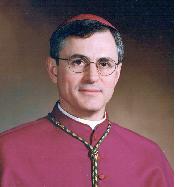



Post Synod: Canadian Influence
Kris Dmytrenko
Sunday, October 26, 2008
 Characterizing the synod's final list of propositions as a competition between bishops would be vulgar. Still, it merits examination whether the ideas proposed by the Canadian bishops survived the intervention, workshop, summarization and voting phases carried out over the past three weeks.
Characterizing the synod's final list of propositions as a competition between bishops would be vulgar. Still, it merits examination whether the ideas proposed by the Canadian bishops survived the intervention, workshop, summarization and voting phases carried out over the past three weeks.
For last week's Catholic Register, I interviewed Archbishop Terrence Prendergast and Bishop Ronald Fabbro about their respective synod presentations. Here is where their recommendations found form among the 55 approved by the synod fathers (and now on Pope Benedict's desk for consideration).
Proposition 29
The intervention by the Archbishop of Ottawa is well represented here. Echoing the Archbishop's concerns, the unofficial translation reads, "Sometimes there may be difficulties in reading the Old Testament because of texts containing elements of violence, injustice [and] immorality." The proposition recommends "adequate preparation of the faithful to read these pages and training to read the texts in their historical and literary context." Further, the bishops warn against the temptation by some Catholics to simply neglect reading the Hebrew Scriptures.
Propositions 14 and 18
 The London Bishop's presentation was a plea for deep listening to the Word of God, rather than the going-through-the-motions formalism that "cripples" the faithful. His point is affirmed in proposition 18 when the synod acknowledges that effective listening is difficult "in the midst of the uproar" of modern society. As a solution, the Bishops propose that the faithful should "cultivate a provision for interior silence."
Proposition 14 adds some very practical considerations to improve listening during the liturgy. Among them, the synod issues a reminder for silent pauses after the first and second reading, adequate training for readers, provision for the blind and deaf, and consideration for acoustic equipment. Numerous propositions also referenced the promotion of lectio divina, which involves prayerfully reading and listening to the Word.
Tomorrow, we'll consider the contributions of the two other delegates of the Canadian episcopal conference, Bishop Luc Bouchard of Saint Paul, Alberta and Bishop Raymond St-Gelais of Nicolet, Quebec.
The London Bishop's presentation was a plea for deep listening to the Word of God, rather than the going-through-the-motions formalism that "cripples" the faithful. His point is affirmed in proposition 18 when the synod acknowledges that effective listening is difficult "in the midst of the uproar" of modern society. As a solution, the Bishops propose that the faithful should "cultivate a provision for interior silence."
Proposition 14 adds some very practical considerations to improve listening during the liturgy. Among them, the synod issues a reminder for silent pauses after the first and second reading, adequate training for readers, provision for the blind and deaf, and consideration for acoustic equipment. Numerous propositions also referenced the promotion of lectio divina, which involves prayerfully reading and listening to the Word.
Tomorrow, we'll consider the contributions of the two other delegates of the Canadian episcopal conference, Bishop Luc Bouchard of Saint Paul, Alberta and Bishop Raymond St-Gelais of Nicolet, Quebec.
 The London Bishop's presentation was a plea for deep listening to the Word of God, rather than the going-through-the-motions formalism that "cripples" the faithful. His point is affirmed in proposition 18 when the synod acknowledges that effective listening is difficult "in the midst of the uproar" of modern society. As a solution, the Bishops propose that the faithful should "cultivate a provision for interior silence."
Proposition 14 adds some very practical considerations to improve listening during the liturgy. Among them, the synod issues a reminder for silent pauses after the first and second reading, adequate training for readers, provision for the blind and deaf, and consideration for acoustic equipment. Numerous propositions also referenced the promotion of lectio divina, which involves prayerfully reading and listening to the Word.
Tomorrow, we'll consider the contributions of the two other delegates of the Canadian episcopal conference, Bishop Luc Bouchard of Saint Paul, Alberta and Bishop Raymond St-Gelais of Nicolet, Quebec.
The London Bishop's presentation was a plea for deep listening to the Word of God, rather than the going-through-the-motions formalism that "cripples" the faithful. His point is affirmed in proposition 18 when the synod acknowledges that effective listening is difficult "in the midst of the uproar" of modern society. As a solution, the Bishops propose that the faithful should "cultivate a provision for interior silence."
Proposition 14 adds some very practical considerations to improve listening during the liturgy. Among them, the synod issues a reminder for silent pauses after the first and second reading, adequate training for readers, provision for the blind and deaf, and consideration for acoustic equipment. Numerous propositions also referenced the promotion of lectio divina, which involves prayerfully reading and listening to the Word.
Tomorrow, we'll consider the contributions of the two other delegates of the Canadian episcopal conference, Bishop Luc Bouchard of Saint Paul, Alberta and Bishop Raymond St-Gelais of Nicolet, Quebec.Categories:
Related Articles:
<<
SUPPORT LABEL
$50
$100
$150
$250
OTHER AMOUNT
DONATE
Receive our newsletters
Stay Connected
Receive our newsletters

Stay Connected







